TRUST: The Plan
Incremental, Widespread, Intentional, Endless Exploitation at All Levels
The rabbit hole less traveled presents many seemingly simple, foundational questions that are often taken for granted by much of the population; therefore, they are not often asked or discussed, and as a result, are rarely considered deeply for understanding, continuous learning, and adjustment. One example, though not the focus of this piece, is “what is money?”
Historical analysis reveals answers to these questions were well known and respected by generations long forgotten, who learned the lesson through a season of hard times. As the cycle described by Michael Hopf goes, “Hard times create strong men. Strong men create good times. Good times create weak men. And, weak men create hard times.”
As the separation from pain increases, the importance of the lesson decreases, until it’s forgotten altogether. Slowly, weak men allow the enemy to pervert the truth, until it’s wholly replaced with lies.
We will focus on the following seemingly simple, foundational question.
Who or what do you TRUST?
First, let’s define TRUST.
I underline descriptions and highlight examples illustrating key aspects of TRUST. A tremendous amount of meaning is compressed into this word! Let’s break it down.
1) TRUST is a firm belief, or FAITH.
In what? Reliability, truth, ability, or strength. The example states, “relations have to be built on TRUST.”
You might have a firm belief that:
Your car will operate properly (reliability).
The Bible reveals the Way (truth).
Your body will keep functioning (ability).
The airplane wings will stay attached during flight (strength).
This definition is crucial to understand—recognizing how belief systems affect thoughts, motivations, and behaviors within a population.
Let’s also discuss the qualifiers.
TRUST is acceptance of truth without evidence or investigation. Stated differently, TRUST is blindly believing what someone or something says is true without verification. Stated simply, “TRUST, don’t verify.”
TRUST without evidence and investigation outsources thinking, decision making, and personal responsibility, which substantially increases the risk of exploitation.
TRUST is having responsibility for a person or duty. That second part is important. TRUST can be traded for duty, which is “a moral or legal obligation; a responsibility.” TRUST is transactional in nature and is traded through social contracts, often backed by decrees, handshakes, laws, compliance officers, judges, and war.
The example states, “rulership is a TRUST from God,” further illustrating how TRUST can be held, gifted, sent, and received.
There’s even more meaning compressed into this word!
Let’s break it down.
2) TRUST is property held with a third party (TRUSTEE) who has a defined duty to act for the good on behalf of a beneficiary. Stated differently, TRUST is personal, private property, valuable enough to safeguard. I’ll highlight that TRUST is an asset.
3) TRUST is a company having or trying to get a monopoly. I find it hilarious this dictionary considers the definition, [dated]. Last I checked, resource centralization was a prevalent and relevant topic worldwide. “The FTC's competition mission is to enforce the rules of the competitive marketplace — the antiTRUST laws,” to “promote vigorous competition and protect consumers from anticompetitive mergers and business practices.”
When a monopoly exists, especially over vital resources, populations are forced to either TRUST the monopoly (to do the right thing) or lose access to the market. I’ll highlight that TRUST can be centralized.
4) TRUST is credit. The example states, “my master lived on TRUST at an alehouse.” I find it even more hilarious this dictionary considers this definition [archaic]. While that scenario may be less common, our entire system is built on credit and debt. Modernizing the example, the barkeep ran a credit check on the master, returning a near perfect credit score, so the barkeep allowed the master to open a line of credit, with TRUST that the barkeep would settle any debt in the future. I’ll highlight how TRUST can be used to borrow or steal from the future.
5) TRUST is a hope or expectation. This dictionary also considers this definition to be [archaic]. However, hopes and expectations are ever-present, to varying degrees, amongst the population. I’ll highlight an added layer of complexity—considering where an individual places their TRUST influences their belief systems, which affects their hopes and expectations.
Before we continue, there’s so much meaning compressed into this word, I’ll provide a short summary for emphasis:
TRUST is valuable and deals with belief systems, FAITH, natural law, contracts, transactions, borrowing, integrity, responsibility, duty, property, control, and sovereignty.
Sun Tzu said, “all warfare is based on deception.”
Considering the importance and value, do you think deception of TRUST is on the bottom or tippy top of a dishonest actor’s priority list?
I’ll say tippy top—recognizing the prevalence of propaganda and advertising constantly vying for TRUST. Operation TRUST is a great example of using deception to exploit TRUST.
Is it COINcidence TRUST is a recurring theme in the Q drops, Bitcoin Whitepaper, and Softwar, or is the emphasis attempting to communicate key information?
TRUST in the Q Drops
Q mentions the topic of TRUST in 182 out of 4,966 (currently) drops.
What did Q say about TRUST?
A lot. I encourage you to read the entire subset.
Here’s a high-level summary:
Q tells Anons to TRUST the following:
GOD
MISSION, PLAN
POTUS, Adm. Rogers, Dan
SESSIONS, WRAY, KANSAS, HOROWITZ, HUBER, GRASSLEY
Yourself, your fellow man, that there are more good than bad
(name)
Q tells Anons to NOT TRUST the following:
THE MEDIA
WHAT YOU READ
Q asks the following questions about TRUST:
Do you TRUST MSM, Facebook, Google, YouTube, or Twitter?
Do they count on the fact that people [human psyche] are more prone to believe something if heard over-and-over again by different ‘TRUSTED’ sources?
Who are we taught to TRUST the most? What happens when you can no longer TRUST those elected to represent you?
Do you TRUST the US Military and Chain of Command? Who are TRUSTED Patriots who understand intel collection? Who do you TRUST to keep secrets and complete the mission? Who can we TRUST?
Who can you TRUST? Can you TRUST?
Q makes the following statements about TRUST:
This movement challenges people to not simply TRUST what is being reported.
Their power and control rely heavily on an uneducated population, who TRUST without individual thought.
Those you are taught to TRUST the most are most guilty of sin, are the most evil.
Backchannels are important, and it’s up to each of us to use discernment, when the media loses TRUST.
Patriots in TRUSTED positions. Thank you for all your TRUST, FAITH, and patriotism. Your TRUST & FAITH is enough. TRUST must be earned.
Stay the course and TRUST the plan. TRUST that you are not alone. TRUST that there are good people right beside you.
In summary, Q reveals easy times have brought hard times, and long-forgotten lessons about TRUST. Q asserts the solution involves identifying and eliminating misplaced and exploited TRUST.
Q emphasizes a few key matters regarding TRUST; in drop #3931, legitimacy and deceit.
In the first section, I underline Q describing the on-going battle for the TRUST and FAITH of the population. Q states that for honest actors to regain TRUST in institutions intentionally and endlessly exploited by dishonest actors, the duties required of that TRUST must be performed.
In the middle section, I underline Q highlighting how [evil] was allowed to flourish through all parts of our society due to it being protected, safeguarded, and camouflaged to appear as TRUSTED.
Stated differently, wolves in sheep’s clothing were successful at infiltrating, fooling, gaining the TRUST of, and feasting on the sheep without detection.
Ultimately, incremental, widespread, intentional, endless exploitation of TRUST at all levels is a root cause of the many evils we have encountered along the way.
In the last section, I underline Q stating one must only look to see, ‘this is not another [4] year election’, 1 Corinthians 16:13, and ‘we stand together.’ I believe these statements point to the solution.
Recently, Michael Saylor said, “Bitcoin insight is limited to those with a [need] to know. It’s like you look at it, it’s right in front of your face.” This is in reference to individuals who reach a [mortality event], investigate solutions to prevent injury or death (political, economic, psychological, etc.), and discover Bitcoin. Sounds like the precipice to me!
Q is clear the problem penetrates much deeper, and reaches more broadly, than both politics and elections. Again, we are dealing with incremental, widespread, intentional, endless exploitation of TRUST at all levels. Examples include, but are not limited to, fake god, fake government, fake elections, fake money, fake war, fake justice, fake schools, fake news, fake food, fake people, and fake freedom.
In 1 Corinthians 16:13, Paul (formerly Saul) insists the church stand firm in the FAITH in Jesus Christ. Paul was confident in this TRUST due to his encounter with Jesus on the road to Damascus (see Acts 9). Saul, a Jew, a Roman citizen, and Pharisee, was persecuting the followers of Jesus after His death and resurrection. His encounter with Jesus left him blind, until he met a man who was sent by the Lord to heal him. The Truth was verified for Paul, and he developed FAITH as a result, knowing his TRUST was perfectly placed.
There are many ways we must stand together. Each has its intended role and purpose—the usefulness and effectiveness of each change with respect to time. However, there’s only one way to project real world physical power on the digital battlefield in a peaceful and non-kinetic way.
Now let’s discuss, “TRUST, but verify:’
The proverb recognizes the need to place TRUST is inevitable. However, it also recognizes the dangers associated with placing TRUST. Therefore, it demands complete verification prior to placing TRUST. However, in practice, initial-only and infrequent re-verification are common vulnerabilities that are exploited.
Now let’s discuss, “Don’t TRUST, verify:”
TRUST in Bitcoin
Bitcoin: A Peer-to-Peer Electronic Cash System, released on October 31, 2008, contains the term TRUST 14 times in its 9 pages (2-3 pages are references, equations, and graphics). I encourage you to continuously learn about Bitcoin.
Here are a few quotes on TRUST from Satoshi Nakamoto:
Did you catch the unique solution?
Bitcoin allows “any two willing parties to transact directly with each other without the need for a TRUSTED third party.”
Stated differently, Bitcoin removes the need to TRUST.
Stated simply, Bitcoin is TRUST-LESS.
TRUST in Softwar
Softwar: A Novel Theory on Power Projection and the National Strategic Significance of Bitcoin, released on February 18, 2023, contains the term TRUST 288 times in its 400 pages. I encourage you to read Softwar.
Here are a few quotes on TRUST from USSF Major Lowery:
Softwar describes a new Schelling point in warfare, due to a new peaceful and non-kinetic power projection technology (proof-of-work, Bitcoin, Bitpower), and the transition to the next warfighting domain (space). Softwar provides many examples to demonstrate how this weapon can be used to defend against different exploitations of TRUST.
Bitcoin is an electro-cyber security technology, a macro-chip, with implications reaching far beyond money. Softwar contends that due to the wide-reaching implications, its path dependent nature, and the risks of apathy or hostility, Bitcoin is a topic of national strategic significance.
Interestingly, on November 6, 2008, at 3:15 PM, Satoshi referred to winning a major battle in the arms race to gain new territory for freedom.
Conclusion
If asked “what is money,” I’d start with [money is TRUST].
Until January 3, 2009, humanity only had TRUST-BASED options for money, such as seashells, glass beads, precious stones, precious metals, and government-issued paper currencies. Due to the physical nature of these monies and currencies, people have been forced to TRUST that others will not exploit TRUST using dishonest scales, close trade routes, levy sanctions, counterfeit, double spend, steal, manipulate markets, etc.
Bitcoin, while much more than money, is revolutionary to money, because it is TRUST-LESS. Bitcoin allows populations to regain their TRUST.
Next, I’d flesh out important points from this article and connect that with [fiat currencies exploit TRUST].
Robert Breedlove often says, “inflation is theft.” Currently, our system is one massive, intentional, continuous exploitation of TRUST. [Cantillionaires love money]. The incentives of the current system are backwards, and Cantillionaires have mastered the game by perpetually sitting closer and closer to the source of debasement. Ultimately, this exploitation of TRUST results in an infinite amount of purchasing power that can be wielded by the Cantillionaires to defend their position and further their interests.
As discussed in Celebrating 15 Years of Indictments and Justice, [the love of money is a root of all kinds of evil]:
History demonstrates Cantillionaires are overly determined (often tyrannical) to obtain, keep, and gain more TRUST, by any means necessary. I’d suggest that [the love of TRUST] could be exchanged with “the love of money” when considering the meanings of that verse.
Q repeats “TRUST the plan” in 42 drops. I believe this communicates, “TRUST [was] the plan” (among other meanings).
Stated differently, dishonest actors slowly domesticated and enslaved the population through the incremental, widespread, intentional, endless exploitation of TRUST at all levels. Do not miss the importance of [intentional] in the description.
In drop #1328, Q+ (Trump) draws [FOCUS] to the first definition of traitor.
The definition has three options: a person who betrays another, a person who betrays a cause, and a person who betrays any TRUST. It’s one thing to make a mistake affecting TRUST. It’s another thing entirely, to swear an oath to keep TRUST, with pre-meditated intent of exploitation.
Unfortunately, continued participation in TRUST-BASED systems with dishonest actors exploiting TRUST provides continued consent to exploitations. Fortunately, when governments become destructive to the ends of Life, Liberty and the pursuit of Happiness, it’s the right, the duty, of the people to throw off such Government, and to provide new guards for future security.
Softwar is a book on [national security]. Softwar is a book on [digital 1776].
Will you take your TRUST back?
I’ll leave you with another great example of using deception to exploit TRUST (h/t GMONEY:)
Again, who and what do you TRUST?
Badlands Media articles and features represent the opinions of the contributing authors and do not necessarily represent the views of Badlands Media itself.
If you enjoyed this contribution to Badlands Media, please consider checking out more of PiP’s work for free on Substack.
Badlands Media will always put out our content for free, but you can support us by becoming a paid subscriber to this newsletter. Help our collective of citizen journalists take back the narrative from the MSM. We are the news now.


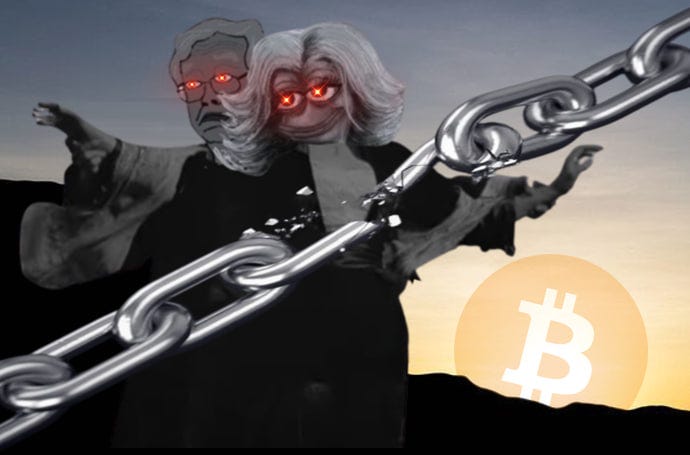
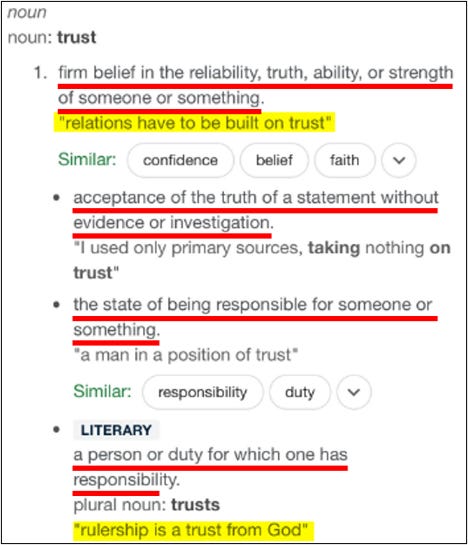
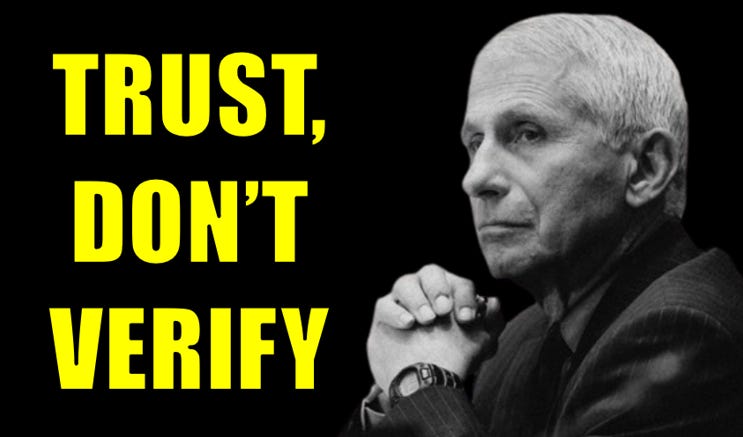
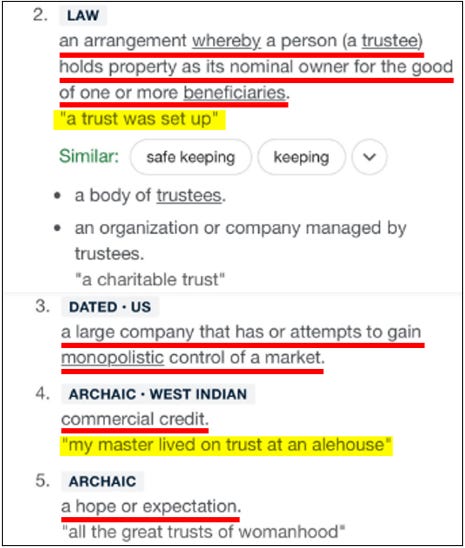

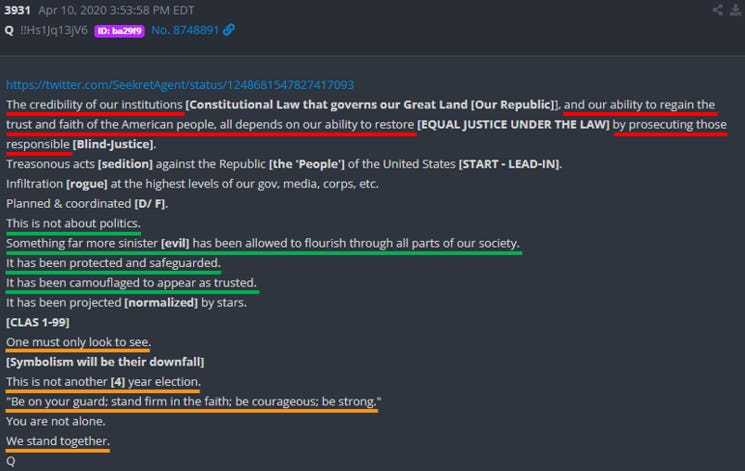
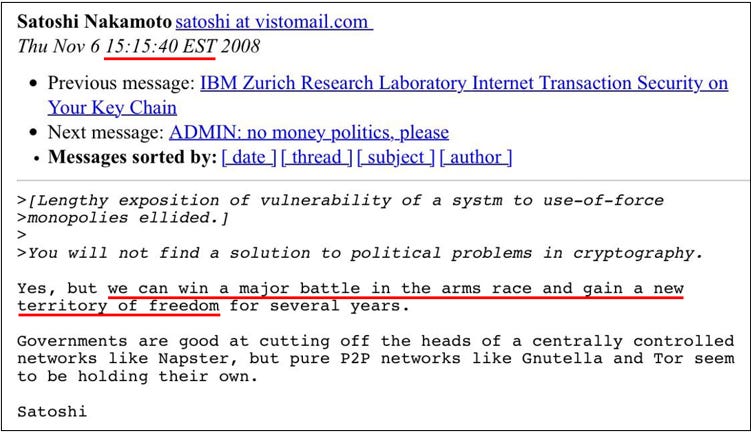


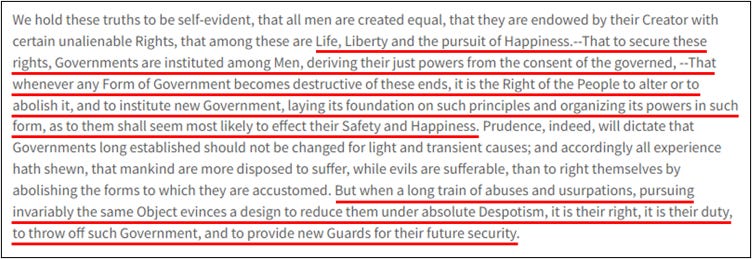
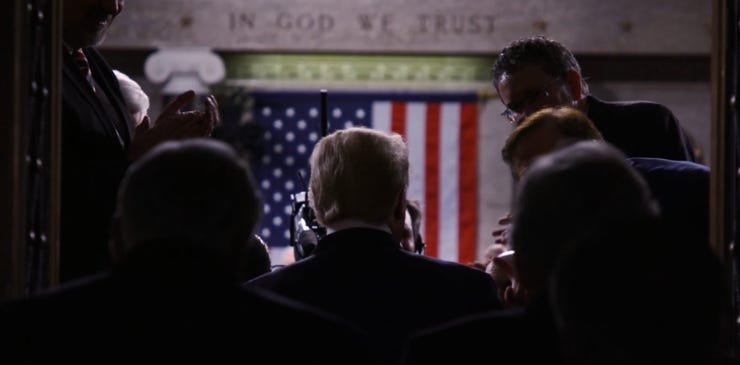
Another banger PIP! BOOOM!
I am an admitted novice when it comes to Bitcoin/Crypto.
The concept of the 21 million coin limit to control inflation could align with the idea of the "Shekel" as the means of pricing in the economy the Lord offered His covenant people in Lev.26 - though there the Trust was in the Eternal Trust-worthiness of our Loving Creator.
What has always troubled me is the assurance I hear that Bitcoin will never be centralized and cannot be manipulated; the first which no one can actual guarantee, the other which, though technically true does not mesh with common understanding of the concept of manipulation.
For example: What do we call the 231 cases of stolen Bitcoin (nearly untraceable) totaling $1.7 billion dollars in 2023 (that's over $7 million per hack) and the fact that more than 80% of the hacks are from individual's wallets. Put another way - with a price of $60,000 per coin and roughly 19.6 million coins minted, the total market value of the coins is $1.176 trillion US dollar - meaning more than 10% of the market value was hacked/stolen. And a complete aside - our current debt is 34 trillion clams (cuz' dollars mean nothing) and our GDP is roughly 25 trillion. Which would mean the implications for conversion could create significant hoarding and immeasurable disparity - and that's just here. Sorry - but all of that smacks of the GESARA/NESARA nonsense. (Hope I did not offend anyone.)
I will gladly do my own research, but if you can help me understand how a "trust-less" solution is superior by sending me to a good resource I would appreciate it.